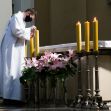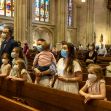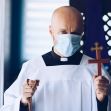The latest church v. state battle to come before the U.S. Supreme Court has resulted in a draw. No, California can’t totally shut down places of worship in an effort to protect its citizens from a pandemic. Yes, churches may stay open, but only if proper health and safety precautions are taken.
Chief Justice Roberts’ opinion concurred in granting injunctive relief to the churches, striking down California Governor Gavin Newsom’s complete ban in favor of a 25% capacity cap on indoor worship services. The court also struck down the state’s prohibition on singing and chanting.
In the 6-3 decision on February 5, Justice Gorsuch wrote, “Since the arrival of COVID–19, California has openly imposed more stringent regulations on religious institutions than on many businesses,” while noting that “Apparently, California is the only State in the country that has gone so far as to ban all indoor religious services…When a State so obviously targets religion for differential treatment, our job becomes that much clearer.”
The majority opinion in South Bay United Pentecostal Church, et. al. v. Gavin Newsom, Governor of California, was joined by Justices Thomas and Alito and in part by Justices Barrett and Kavanaugh. It explained that “strict scrutiny” must be applied and that in doing so the individual’s First Amendment rights to freedom of religion must be “pitted against” the government’s claim of “special expertise in a matter of high importance involving health or safety.”
Gorsuch explained that even in times of crisis we “have a duty to hold governments to the Constitution,” then discounted California’s reason for imposing an “especially onerous regulation.” California’s closure was based on the large number of individuals attending religious services in close proximity for extended periods of time, with singing, which is usually done without masks.
Then, while agreeing that these activities “may increase the risk of transmitting COVID-19, and agreeing that the State has a compelling interest in reducing that risk, it chided California for its inability to address these concerns without a total ban. The Court’s opinion noted that not everyone worships in the same manner and stated that other businesses, such as train stations or those with check-out lines, created similar risks, but were not banned.
When California suggested that its mild climate might make outdoor worship possible, Justice Gorsuch said that the State did not force manicurists, hairstylists or retailers to “do all their business in parking lots and parks.” It also criticized the State for not imposing narrower options such as social distancing, masks, barriers and time limits on the length of services. He said similar measures are now routinely used in religious services throughout the country.
The opinion was especially critical of the State’s ban on singing. Justice Gorsuch cited the hypocrisy of the ruling, attributing it to “California’s powerful entertainment industry,” which he claimed did not have a similar ban. He wrote, “So, once more, we appear to have a State playing favorites during a pandemic, expending considerable effort to protect lucrative industries (movie studios) while denying similar largesse to its faithful.”
It stated that instead of a ban, singing could be performed by a single masked cantor at Jewish services or a muezzin who could sing a call to prayer as Muslim worshipers gathered. The case was brought by two churches, but the California ban clearly covers synagogues and mosques as well.
It also discounted California’s argument that the ban is only temporary, since it began in August, 2020. It held that other businesses do not have similar bans. Gorsuch concluded, “If Hollywood may host a studio audience or film a singing competition while not a single soul may enter California’s churches, synagogues, and mosques, something has gone seriously awry.”
The court’s three liberal Justices, Kagan, Breyer and Sotomayor filed dissenting opinions. Written by Justice Kagan, the dissent first acknowledged that the Justices of the court are not scientists with much knowledge of public health policy. Yet, she expressed her concern with the Court’s majority opinion that “displaces the judgments of experts about how to respond to a raging pandemic.”
She disagreed with the majority opinion that claimed religion was targeted for different treatment and said that California’s “policies treat worship just as favorably as secular activities that, according to medical evidence, pose the same risk of COVID transmission.” She said that the majority’s mandate “defies our case law, exceeds our judicial role and risks worsening the pandemic.”
In denying the full injunction, she cited case law that holds the First Amendment demands “neutrality” in religious actions. She said that this standard is met because California treats worship service the same way it treats other gatherings “where large groups of people (come together) in close proximity for extended periods of time” and she pointed out that the rules are the same for political meetings, movies, concerts, restaurants, wineries and bars. She said there was no evidence of preferential treatment for movie studios.
She then pointed out that California’s capacity limits vary with COVID-19 rates. When they are highest, the state’s mild climate facilitates outdoor worship. Citing evidence from epidemiologists, she concluded that requiring services to move outside is not the same as banning them and that “verbal interaction” especially singing, chanting or loud vocalization increases transmission risks.
In conclusion, she also objected to the confusion the partial grant of the injunction will cause. It does not give adequate guidance about acceptable capacity limits, nor does it give clarity to when indoor bans might be allowed. In addition, she frowned on the Court imposing its own judgment instead of listening to the best scientific evidence.
The High Court’s new decision is the latest foray into the difficult task of balancing worship with pandemic concerns. Last November, the Supreme Court struck down part of New York’s COVID-19 rules that limited religious gatherings to 25 persons, stating in Roman Catholic Diocese v. Cuomo that worship services were being singled out for “especially harsh treatment.”
The following week, the High Court granted an appeal from California churches asking for reconsideration of the Newsom ban. The justices set aside a decision based on the New York case, but when two district judges and the 9th Circuit upheld Newsom’s rulings in January because California was the nation’s latest COVID-19 hotbed, lawyers for the two churches asked for an emergency injunction on the state’s restrictions. The February ruling followed.






